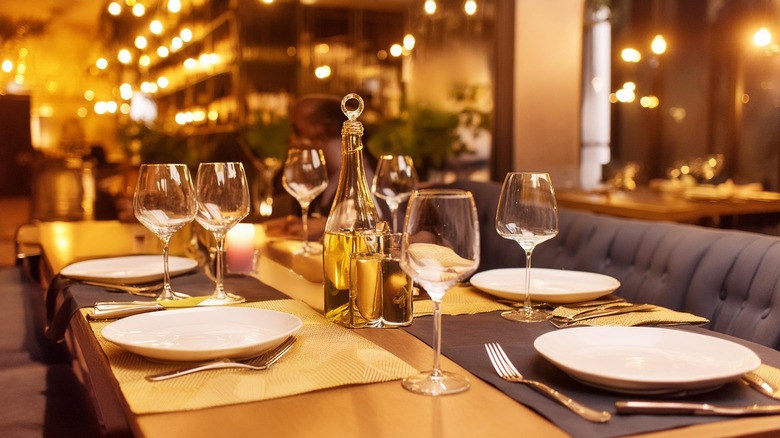No, The Staff At A Restaurant Probably Can't Change The Music Playing. Here's Why
"Is it reasonable to request certain songs at restaurants?" asks one Reddit user in a post. "Sometimes I just feel like playing a song that fits the vibe of the restaurant ... Is it something appropriate for a customer to ask the server? I wonder if it's allowed in general as long as I tip well." In the not-so-humble opinion of this longtime service industry professional turned food writer, the answer to this amateur DJ is a resounding "no." The word "inappropriate" doesn't even begin to describe this request, and anyway, it's typically an impossible one.
In restaurants, background music is a crucial element of the ambiance. It should reflect the style, theme, and energy level of the setting, match the tone and tempo of human conversation, and mask noises like your fork clanking against your plate, putting patrons at ease to relax and enjoy. That's why, often, especially in chain restaurants and fine-dining establishments, the music is a playlist decided by corporate, which loops every three to six hours.
Bartenders typically get to play their own music behind the stick (and bar etiquette says you should leave the vibe-curation to them, for the record, even if you've had three espresso martinis and it's your friend's birthday and she loves Hall & Oates. Leave it alone). But, in restaurants, it's a safe bet that the tunes playing on the overhead speaker are not the front-of-house employees' picks. Chances are your server might want to change the music even more than you do.
Restaurant music is often a set playlist designed by higher-ups
In response to the original Reddit question, leave the mood-setting aspirations at home and take out your wallet — it's time to buy some decks to practice spinning records for that closeted passion toward a career as a disc jockey. While the wallet's still out, saying "as long as I tip well" to get what you want is inappropriate. In modern America, tipping service workers is no longer just a recognition of above-average service, but mandatory to ensure low-wage workers leave their shifts with a livable wage. It's why "expected tip average" is factored into the set hourly rate businesses are legally allowed to pay employees, and it's commonly below minimum wage. At restaurants in Brooklyn, NY, $9 hourly before tips is typical pay for servers (just enough to ride the subway three times, two rides of which account for the commute to and from work every day), so when a patron walks in thinking a decent tip should earn them special treatment or even radio privileges, they are misguided. They should be thankful for the server doing what's in their job description well, and be especially thankful for having (clearly) never worked a service job in their life.
If the restaurant you're patronizing is an exception to the common industry practice and the front-of-house staff do get to choose which songs they'll work to for hours and hours: Good. Servers should be able to control at least this aspect of their shifts. Don't ask to play a song.

